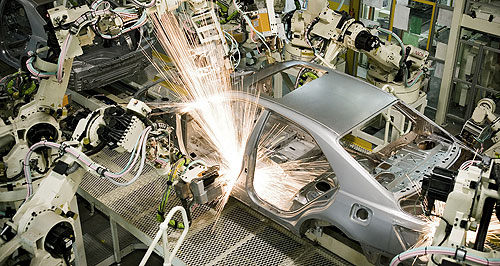News - General News - GovernmentNo free lunches, warns car industry submissionTough love: The first submission to the Productivity Commission inquiry into the automotive industry suggests we would be better off without it. First submission to Productivity Commission lays down harsh realities11 Nov 2013 By BARRY PARK THE first submission to the Productivity Commission’s inquiry into Australia’s automotive manufacturing industry has warned that when it comes to industry assistance, there are no free lunches. The submission from Garry M. White, the first since the commission’s terms of reference were set late last month, paints a gloomy picture of car industry support, suggesting it costs jobs in other industries, faces further threats to its viability, and that tipping more support into an industry least able to compete makes no economic sense. According to Mr White, instead of propping up our car industry Australia should take advantage of the subsidies poured into foreign car-makers. “Foreign subsidies to the production of vehicles exported to Australia (subject to adequate competition among importers) are a benefit to Australian consumers,” the submission reads. “Any attempt to offset access to cheaper imported vehicles is either a direct cost to local consumers (including local industry) or a cost borne by taxpayers if the mechanism used involves direct transfers. “Any consideration of the costs and benefits of further Government assistance should involve a consideration of the impact on consumers and taxpayers and the opportunity cost of the resources diverted by virtue of such assistance from other uses.” Mr White also argues that the investment boom fostered by the mining industry has not helped Australian car-makers, tipping the economic balance in favour of imported goods. “Consequently, a range of import-competing industries and export industries will decline in absolute or relative size as the mining sector expands,” he says. “From a national perspective it is only possible to shield certain industries from these adjustment pressures by exacerbating the adjustment pressures being felt by other industries. “This is the context in which further assistance to the motor vehicle industry needs to be assessed,” he says. “There is no free lunch in industry assistance. To the extent to which the adjustment pressures being faced by the motor vehicle industry are offset by further assistance it will only increase those pressures faced by other industries. “Any ‘saving’ of jobs in the motor vehicle industry are likely to be offset in job losses in other industries including for example other manufacturing industries, education and tourism.” According to Mr White, the rational economic approach would be to take advantage of economic factors, with national interest “best served by Australians having access to the latest vehicles and most efficient vehicles at the lowest cost”. “It is more than likely that the overall employment benefits of such a policy would be greater than the loss of jobs in the motor vehicle sector,” he says. He argues that the commission should “critically assess” claims that the flow-on effects to the Australian economy from the car-making industry are enough to offset the cost of the assistance given to it. Mr White also lashes out at the claim that the industry may be able to improve its productivity. “The systematic provision of greatest assistance to industries least able to compete makes a complete economic nonsense,” he says. “The Tariff Board (the very antecedent of the Productivity Commission) pursued its references on the basis of the ‘compensating tariff’ whereby industries got the minimum assistance they needed to survive in the Australian economy. “The Tariff Board was replaced in order to get away from needs based assistance and the gross misallocation of national resources which ensued,” he says. “Government responses to the demands of the motor vehicle industry run the risk of a dangerous return to failed policies.” Submissions to the inquiry close on November 27. The Productivity Commission will hand down its preliminary findings on December 20, and a position paper at the end of January. The final report to government is expected to be tabled before parliament on March 31, 2014.  Read more7th of November 2013  Think-tank calls for end to car industry handoutsStudent-style loans proposed as a solution to shrinking public subsidy purse5th of November 2013  Carr criticises cabinet in-fighting on car industryLib “free-trade fantasies” threaten car-makers, says Labor spokesman Carr4th of November 2013  Car industry closure would cost $21.5 billionMelbourne, Adelaide would be “devastated” by car industry closure, says study |
Click to shareGeneral News articlesResearch General News Motor industry news |
















Facebook Twitter Instagram